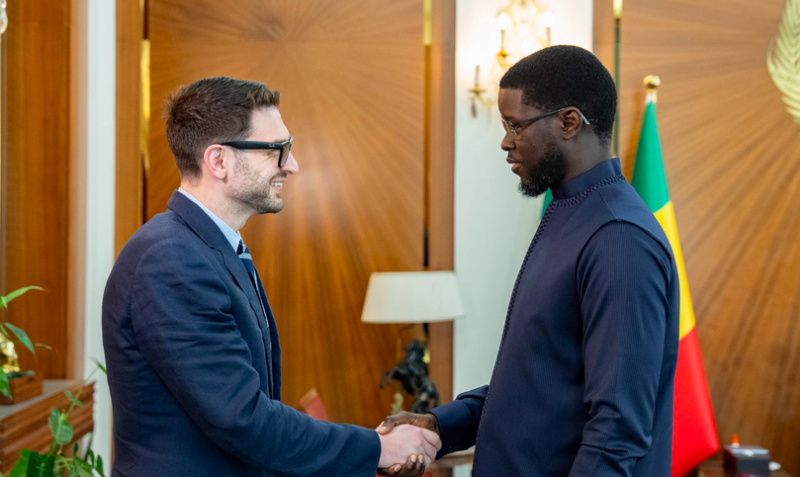Gambiaj.com – (DAKAR) – After previously criticizing Macky Sall for meeting with Alex Soros, PASTEF activists now find themselves in an awkward position following President Faye’s audience with the head of the Open Society Foundations. The high-profile meeting has triggered a wave of criticism on social media and revived national anxieties over perceived foreign influence and the promotion of LGBT rights.
The visit, which took place earlier this week, sparked outrage among both opposition figures and supporters of the ruling PASTEF party.
Critics argue that the meeting undermines the government’s commitment to traditional values and contradicts past rhetoric by key members of the current regime who had condemned similar engagements during former President Macky Sall’s tenure.
Among the loudest voices in the past was Amadou Ba, now a member of the National Assembly, who once labeled Soros “a great promoter of homosexuality.”
Back in 2023, Ba had publicly decried the Macky Sall administration for hosting Soros—then vice president of the foundation—and warned against allowing the organization any influence over sensitive sectors such as education and reproductive health.
He had also pointed to the incarceration of controversial anti-LGBT activist Cheikh Oumar Diagne as evidence of what he called the state’s double standards on the matter.
However, in the wake of the current backlash, Ba has stepped forward to defend the Faye administration. In a statement posted on social media, the lawmaker dismissed the uproar as a “sterile controversy” and argued that the government has remained consistent—and even more assertive—on its position against LGBT advocacy.
Ba emphasized what he described as the government’s firmness on the issue, citing recent events that, in his view, dispel any suspicion of ideological compromise. Chief among them is President Faye’s reported rejection of a Western leader’s offer of development aid tied to pro-LGBT conditions during an exchange at the United Nations.
He also pointed to the swift intervention by Foreign Minister Yassine Fall, who shut down a regional LGBT-themed conference hosted by a Western embassy in Dakar.
Most recently, Ba referenced the National Assembly’s endorsement of a proposal to strengthen sanctions against LGBT “propaganda,” a bill championed by the conservative Aar Sam Jikko Yi movement.
These actions, Ba insists, are proof that the current government has not softened its stance. He criticized factions within his own political camp for fueling unnecessary debate, urging them to focus on promoting the government’s achievements rather than feeding “a culture of endless polemics.”
“There is no shift in the government’s policy on LGBT issues,” Ba stated, warning that internal divisions risk undermining the ruling coalition’s credibility and distracting from broader national priorities.
The episode underscores the political tightrope President Faye’s government is walking as it seeks to balance international engagement with domestic ideological expectations.
While partnerships with global philanthropic organizations like Open Society Foundations can support governance, human rights, and development, associations with their leadership—especially figures like Alex Soros—remain deeply controversial in a country where same-sex relations are criminalized and cultural conservatism runs deep.
The intensity of the reaction, particularly among PASTEF supporters, reveals a lingering suspicion toward foreign actors and a sensitivity to any perceived compromise on moral values. Even symbolic gestures, such as a meeting with a prominent international figure, can quickly be framed as ideological betrayal.
As President Faye navigates these complexities, the Soros controversy serves as a reminder that political symbolism in Senegal is as consequential as policy itself—and that reconciling diplomacy with national identity remains a defining challenge for his young presidency.










